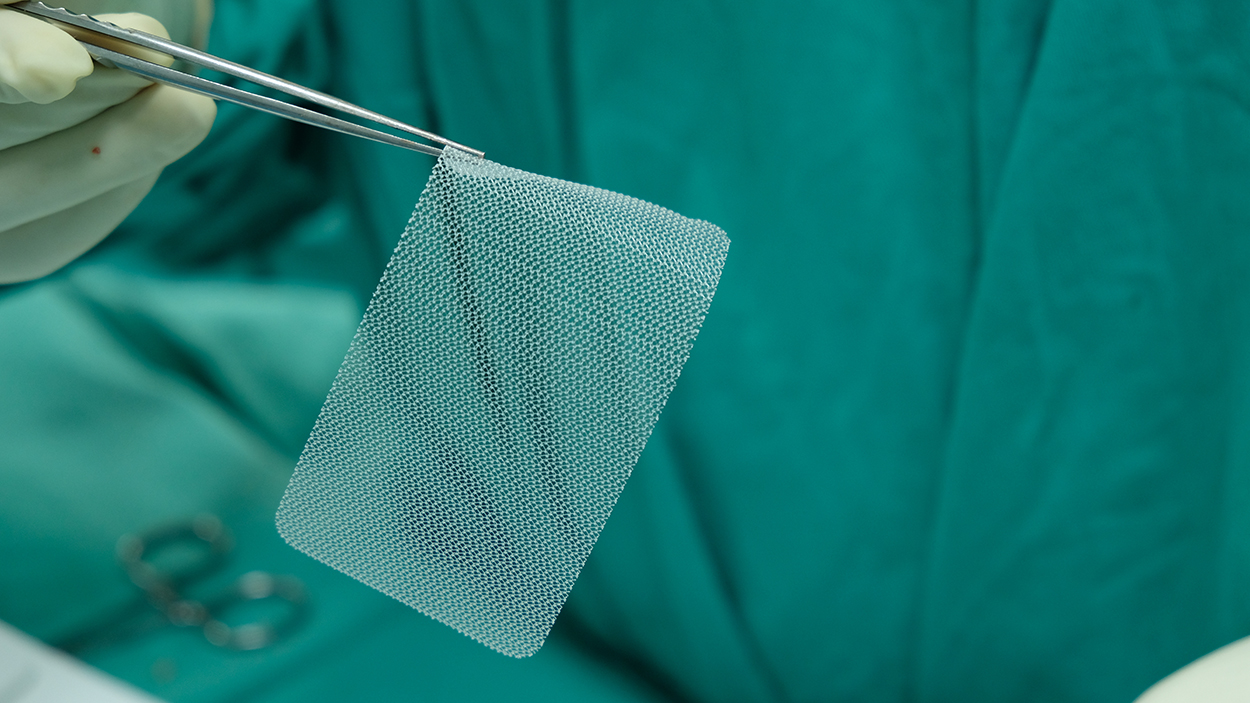Hernia Mesh Lawsuits
A hernia is a painful condition that occurs when tissue or organs bulge through a weak spot or tear in the abdominal muscle. Repair surgery is the only treatment option that can successfully repair a hernia.
Hernia repairs are an extremely common surgical procedure. Doctors perform more than one million hernia surgeries each year in the U.S., and approximately 800,000 of these procedures are to repair inguinal hernias (those occurring in the groin area).
A number of hernia patients are claiming serious complications allegedly caused by a product known as hernia mesh, which is commonly used during hernia repair surgery. Many of these patients have had to have the mesh removed after they sustained infections, punctured organs and bowel obstructions due to the allegedly defective mesh.
Simmons Hanly Conroy is no longer accepting hernia mesh cases.
What is Hernia Mesh?
Hernia mesh is a medical device made of either animal tissue or woven synthetic plastic (polypropylene or polyester) that resembles a piece of window screen. The mesh is available in many sizes, patches, or plugs and some are coated with absorbable fatty acids, cellulose or collagen to protect the internal organs.
Hernia Repair Surgery
Doctors use hernia mesh to repair weakened or damaged tissue that leads to hernias, and mesh is the standard treatment for hernia repair.
There are two types of surgeries commonly performed to repair hernias:
- Laparoscopic, in which the surgeon makes small incisions and inserts surgical tools through these openings. This technique typically involves a shorter healing time and less blood loss, but is more challenging and expensive to perform.
- Open, in which the surgeon makes an incision in the abdomen near the hernia to repair the weak muscle area. Recovery time generally takes about three weeks.
The mesh acts as flexible “scaffolding” to repair muscle walls and prevent organ perforation. Small pores in the mesh allow tissue to grow into the implant, and most mesh repairs are meant to be permanent.


Hernia Repair Complications
Although studies have shown that mesh is effective in hernia repair and also for preventing hernia recurrence, the U.S. Food and Drug Administration (FDA) has warned consumers that hernia mesh may be associated with a number of serious complications, including:
- Adhesions
- Autoimmune reactions to the mesh
- Bowel or intestinal blockage
- Fistulas (abnormal connections between organs)
- Fluid buildup at the surgical site
- Hernia recurrence
- Infection
- Mesh shrinkage
- Nerve Damage
- Mesh Migration or rejection
- Organ perforation
- Pain and bleeding
According to the FDA, many of the complications related to hernia repair surgery concern surgical mesh products that have been recalled and are no longer on the market.
Hernia Mesh Recalls
A number of hernia mesh products have been recalled after patients reported complications including infection, adhesions, bowel obstructions, and the need for hernia mesh removal surgery.
- From 2005 to 2007, C.R. Bard issued three class I recalls on the company’s Kugel Hernia Patch Mesh because of an associated increased risk of fistulas and bowel perforation.
- On January 2006, January 2011, and April 2014, Ethicon recalled its Proceed Surgical Mesh due to “incomplete seals on the product that could lead to delamination and compromised sterility.”
- In 2013, the FDA announced that Atrium had recalledthousands of C-QUR V Patch Meshes and C-QUR Edge Mesh because the fish oil coating on the mesh could stick to the packaging and peel off.
- In 2016, Ethicon released an Urgent Field Safety Notice for Ethicon Physiomesh Composite Mesh and later withdrew the product from the market.
The FDA approved surgical hernia mesh through the agency’s controversial 510(k) clearance program, which only requires manufacturers to prove that the products are “substantially similar” to other products already on the market, without requiring rigorous clinical trials, pre-market research or studies.


Hernia Mesh Lawsuits
Patients injured by hernia mesh have filed lawsuits against manufacturers claiming that the mesh is faulty, poorly designed and the manufacturers hid these risks from consumers.
Atrium, Bard, Ethicon and Covidien have all come under fire over their hernia mesh products, and a number of lawsuits have been filed alleging that the devices are defective in design:
- All federal court lawsuits filed against Atrium Medical Corporation have been consolidated into multidistrict litigation (MDL) in the U.S. District Court for New Hampshire. The plaintiffs in these cases allege defective design, high failure rates and extensive complications associated with Atrium C-QUR Mesh.
- In 2011, C.R. Bard settled approximately 2,600 Kugel cases for $184 million. These cases alleged that a defective memory recoil ring on the products broke while inside the patients, resulting in bowel and intestinal damage.
- The first of many Physiomesh lawsuits filed against Ethicon Inc. is scheduled for trial early in 2018. Physiomesh is coated on both sides, supposedly to protect organs from direct exposure to the mesh and prevent adhesions, but the coating is alleged to also prevent the mesh from properly incorporating itself into the body, leading to mesh migration and organ damage.
Injured by Hernia Mesh? Contact a Pharmaceutical Attorney Today
If you sustained serious and painful injuries associated with hernia mesh, you may be able to recover damages by filing a lawsuit if you:
- Have had mesh implanted to treat a hernia after January 1, 2006.
- Have had surgery to remove or repair the mesh implant.
- Have a surgery scheduled to remove or repair the mesh.
Contact our legal advocates to learn more about your consumer rights.
